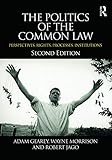The Politics of the Common Law: Perspectives, Rights, Processes, Institutions / Adam Gearey, Wayne Morrison, Robert Jago
Material type: TextPublication details: United Kingdom: Routledge-Cavendish, 2013Edition: 2nd EdDescription: 366 p. : ill. ; 25 cmISBN: 9780415662369 DDC classification: 340.5709
TextPublication details: United Kingdom: Routledge-Cavendish, 2013Edition: 2nd EdDescription: 366 p. : ill. ; 25 cmISBN: 9780415662369 DDC classification: 340.5709 | Item type | Current library | Call number | Status | Date due | Barcode | Item holds |
|---|---|---|---|---|---|---|
 BOOK
BOOK
|
BAC PJ Library | 340.5709 GEA (Browse shelf (Opens below)) | Available | 3202919 | ||
 BOOK
BOOK
|
BAC PJ Library | 340.5709 GEA (Browse shelf (Opens below)) | Available | 3202937 | ||
 BOOK
BOOK
|
BAC PJ Library | 340.5709 GEA (Browse shelf (Opens below)) | Available | 3102010 | ||
 BOOK
BOOK
|
BAC PJ Library | 340.5709 GEA (Browse shelf (Opens below)) | Checked out | 06/27/2023 | 3102028 | |
 BOOK
BOOK
|
BAC PJ Library | 340.5709 GEA (Browse shelf (Opens below)) | Available | 1202647 | ||
 BOOK
BOOK
|
BAC PJ Library | 340.5709 GEA (Browse shelf (Opens below)) | Available | 1202648 | ||
 BOOK
BOOK
|
BAC PJ Library | 340.5709 GEA (Browse shelf (Opens below)) | Available | 1103034 |
Browsing BAC shelves, Shelving location: PJ Library Close shelf browser (Hides shelf browser)
1. Introduction Part I - The politics of the Common Law: perspectives, rights, processes, Institutions, 2. Introduction Part II - Procedural Fairness, the Rule of Law and Due Process, 3. 'As a system...the common law is a thing merely imaginary', 4. Recording law's experience: features of the 'case', 5. The postcolonial, the visible and the invisible: the normal and the exceptional, 6. Institutionalizing Judicial Decision Making: Public Reason and the Doctrine of Precedent, 7. What We Talk About When We Talk About Common Law: The Practice of Precedent , 8. The Mirror and the Dialogue: The Common Law, Strasbourg and Human Rights, 9. The judicial practice of statutory interpretation, 10. The Politics of the Judiciary Revisited: rights, democracy, law, 11. Judges and Democracy, 12. The Integrity of the Court: Judgment and the Prohibition on Bias, 13. The Value of Participation: The Rights of the Defence, Equality of Arms and Access to Justice, 14. Open Justice, Closed Procedures and Torture Evidence, 15. Imagining Civil Justice, 16. Imagining Criminal Justice, 17. Conclusion
The Politics of the Common Law offers a critical introduction to the legal system of England and Wales. Unlike other conventional accounts, this revised and updated second edition presents a coherent argument, organised around the central claim that contemporary postcolonial common law must be understood as an articulation of human rights and open justice.
The book examines the impact of the European Convention and European Union law on the structures and ideologies of the common law and engages with the politics of the rule of law. These themes are read into normative accounts of civil and criminal procedure that stress the importance of due process. The final sections of the book address the reality of civil and criminal procedure in the light of recent civil unrest in the UK and the growing privatisation of public services. The book questions whether it is possible to find a balance between the requirements of economics and the demands of justice.



There are no comments on this title.